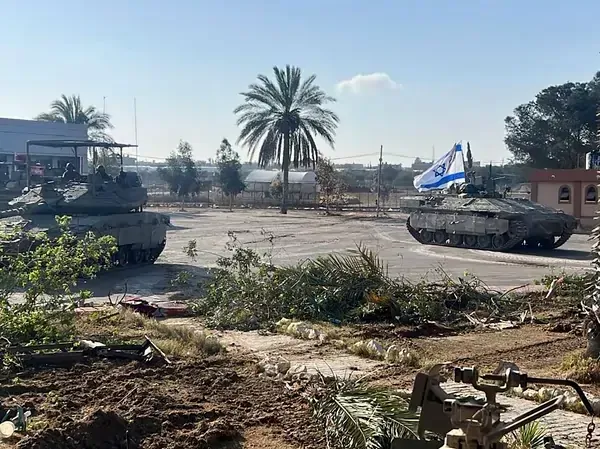The Rafah crossing holds critical importance as the primary conduit for aid entering the besieged enclave and as an exit point for individuals seeking refuge in Egypt. Since the outbreak of hostilities, Israel has maintained full control over all access points to and from Gaza, asserting its dominance over the territory.
According to reports, the Israeli military's incursion into Rafah was prompted by intelligence indicating the crossing's involvement in "terrorist activities." Although specific evidence supporting this claim was not immediately provided, Israeli officials alleged that the vicinity of the crossing had been utilized to launch a mortar attack that resulted in the deaths of four Israeli soldiers near the Kerem Shalom Crossing.
Footage released by the Israeli military depicted tanks adorned with Israeli flags entering the crossing, affirming the seizure of operational control. The military's actions were accompanied by ground troops and airstrikes targeting suspected Hamas positions in Rafah, further escalating tensions in the region.
Wael Abu Omar, spokesperson for the Palestinian Crossings Authority, confirmed the seizure of the crossing by Israeli forces and acknowledged the closure of the facility. He also noted that the area had been subjected to strikes since the previous day, exacerbating the already dire humanitarian situation in Gaza.
The Egyptian Foreign Ministry refrained from immediate comment on the Israeli seizure, highlighting the sensitivity of the situation. Egypt, which shares a border with Gaza, has previously expressed concerns that any seizure of Rafah could precipitate an influx of Palestinian refugees into its territory, potentially jeopardizing longstanding peace agreements with Israel.
Meanwhile, efforts to broker a ceasefire have encountered numerous obstacles, with both Israel and Hamas expressing reservations over proposed terms. The proposed ceasefire, mediated by Egypt and Qatar, reportedly entails multiple stages, including a limited hostage release and partial Israeli troop withdrawals from Gaza.
Hamas, however, has insisted on clearer guarantees regarding the cessation of hostilities and the complete withdrawal of Israeli forces from the territory. Israeli leaders, on the other hand, have remained steadfast in their refusal to accede to Hamas' demands, vowing to continue their military campaign until the militant group is dismantled.
The latest offensive in Rafah has reignited concerns about the possibility of an all-out Israeli assault on the city, a scenario vehemently opposed by the United States and humanitarian organizations. With over 1.4 million Palestinians residing in Rafah, the potential humanitarian consequences of such an assault are dire, prompting calls for restraint and a return to the negotiating table.
Despite the challenges and uncertainties surrounding the ceasefire negotiations, there remains a glimmer of hope that a diplomatic resolution to the conflict may yet be achieved. However, as the situation on the ground continues to evolve, the prospects for peace in Gaza remain tenuous, underscoring the urgent need for a concerted international effort to de-escalate tensions and address the root causes of the conflict.

